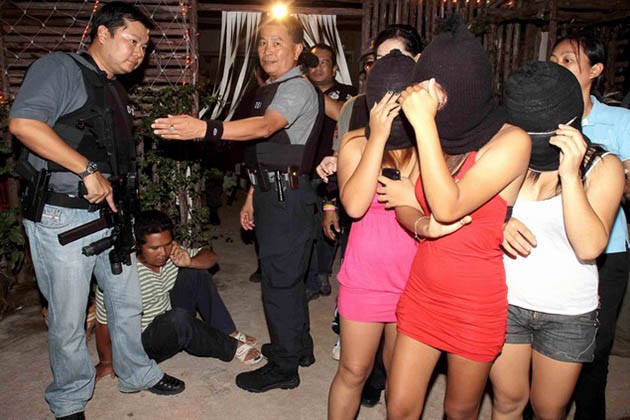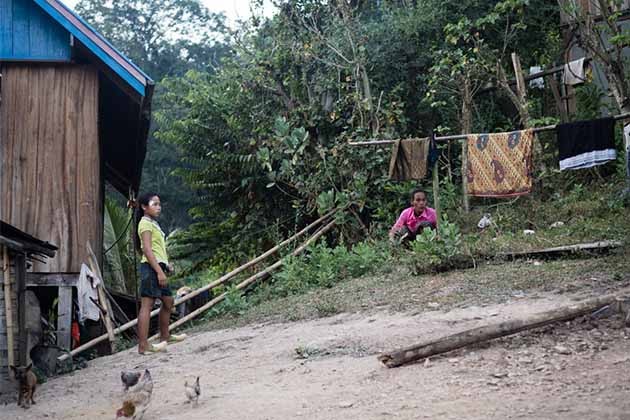Laos Sex Tourism, though illegal, remains a hidden issue, especially near tourist hotspots. SIXT.VN offers safe and reliable travel services, helping you explore the real beauty of Laos responsibly. Plan your ethical Laos adventure with us, focusing on cultural experiences and natural landscapes instead of the red-light districts, sex industry, or human trafficking issues often associated with unethical tourism.
1. What is the Legal Status of Prostitution in Laos?
Prostitution in Laos is illegal and subject to prosecution. While the practice exists, it is not supported by Lao society, and authorities actively discourage it, although enforcement can be inconsistent. This differs from some neighboring countries where certain aspects of the sex trade may be tolerated or regulated differently.
Prostitution is against the law. According to a report by the United Nations Development Programme, Laos has laws against prostitution to combat exploitation and protect vulnerable populations. It’s a criminal offense that can result in fines and imprisonment for both sex workers and those who patronize them. Despite the illegality, the practice persists, often driven by poverty and lack of economic opportunities, particularly in rural areas. The government is trying to combat this through law enforcement and social programs.
2. Where Do Most Prostitutes in Laos Come From?
Most prostitutes in Laos come from poor, rural families, including ethnic minorities. These individuals often lack economic opportunities and may view prostitution as a means of survival. Some women may be trafficked into Laos from neighboring countries, further exacerbating the problem.
According to a study by the Lao National Commission for Mothers and Children, poverty and lack of education are significant factors driving young women into prostitution. Women from rural areas often migrate to urban centers or border regions in search of work and become vulnerable to exploitation in the sex industry. The lack of job skills and limited educational attainment makes them susceptible to recruitment by brothels or individuals involved in human trafficking.
 Women working in rice paddy fields in rural Laos, highlighting the economic challenges that can lead to exploitation and prostitution.
Women working in rice paddy fields in rural Laos, highlighting the economic challenges that can lead to exploitation and prostitution.
3. What are the Main Causes of Prostitution in Laos?
Poverty is a primary driver of prostitution in Laos. The country’s proximity to Thailand, known for its sex industry, also contributes to the issue. A lack of education and limited employment opportunities push vulnerable individuals into sex work as a means of survival. According to research, poverty is a huge factor in this problem.
A 2015 report by the Asia Foundation found that economic hardship is the most significant factor driving individuals into prostitution. The report highlights that many sex workers come from families with little or no land, limited access to education, and few employment prospects. The lure of quick money can be particularly strong for those struggling to meet basic needs. Additionally, the report points out that cross-border trafficking contributes to the issue, with women and girls being lured from Laos to neighboring countries with promises of better jobs, only to be forced into prostitution. According to a study by the International Labour Organization, access to education and vocational training can significantly reduce the risk of exploitation in the sex industry.
4. Where are the Common Places to Find Sex Workers in Laos?
While brothels are illegal in Laos, sex workers are often found in entertainment venues such as beer bars, karaoke bars, nightclubs, guesthouses, and restaurants. The Golden Triangle Special Economic Zone in Bokeo Province is also known as a hub for gambling, prostitution, and illicit trade.
While brothels are against the law, the Lao Ministry of Public Security acknowledges that sex workers often operate in entertainment venues. A 2018 report by the U.S. State Department on human trafficking highlights that these venues sometimes serve as fronts for prostitution. Sex services are typically offered discreetly, and transactions often occur in guesthouses, hotels, or private rooms. The Golden Triangle Special Economic Zone, with its lax regulations and cross-border traffic, has become a notorious location for various illicit activities, including prostitution.
 A vibrant street scene in Laos at night, representing the nightlife and entertainment venues where prostitution may occur.
A vibrant street scene in Laos at night, representing the nightlife and entertainment venues where prostitution may occur.
5. What are the Penalties for Sex with a Child in Laos?
Although the law of Laos does not contain penalties for child prostitution, there will have the penalty for sex with a child with a fine of 500.000 to three million kips ( nearly $60 to $360) and 5 years prison. The Lao government takes child sex tourism seriously and actively works to prevent it.
According to the National Plan of Action for the Prevention and Elimination of Sexual Exploitation of Children in Laos, anyone caught engaging in sexual activity with a minor faces severe penalties, including lengthy prison sentences and substantial fines. The government has also launched public awareness campaigns to educate the public about the dangers of child sex tourism and to encourage reporting of suspected cases. The Lao Women’s Union plays a key role in providing support and rehabilitation services to child victims of sexual exploitation.
6. Is Gay Sex Tourism Prevalent in Laos?
Gay sex tourism exists in Laos, though it is less visible than heterosexual prostitution. While sex between tourists and locals is technically against the law, enforcement is rare. However, individuals engaging in such activities may face negative social reactions.
The Lao constitution does not explicitly address same-sex relationships, but societal attitudes tend to be conservative. While there are no specific laws prohibiting gay sex between consenting adults, public displays of affection and same-sex partnerships are not widely accepted. A report by Human Rights Watch indicates that LGBTQ+ individuals in Laos may face discrimination and stigma, which can make them vulnerable to exploitation. However, the situation is slowly evolving, with increasing awareness and advocacy for LGBTQ+ rights.
7. What is the Level of Awareness About Prostitution in Laos?
Awareness about HIV/AIDS and other sexually transmitted infections (STIs) is limited in Laos due to cultural sensitivities and conservative attitudes towards sexuality. This lack of awareness can contribute to the spread of STIs among sex workers and their clients.
A study by the Lao Ministry of Health found that knowledge about HIV/AIDS prevention is lower in rural areas compared to urban centers. Cultural taboos surrounding sex and sexuality make it difficult to openly discuss these issues and promote safe sex practices. The government, with support from international organizations like UNAIDS, is working to improve awareness through educational programs and outreach campaigns, particularly targeting vulnerable populations such as sex workers and young people.
 People gathered in a rural village in Laos, illustrating the challenges in spreading awareness about HIV/AIDS and safe sex practices due to cultural sensitivities.
People gathered in a rural village in Laos, illustrating the challenges in spreading awareness about HIV/AIDS and safe sex practices due to cultural sensitivities.
8. What is the Prevalence of HIV/AIDS Among Sex Workers in Laos?
The prevalence of HIV/AIDS among sex workers in Laos has been estimated to be between 0.8 percent and 4.2 percent. While efforts to combat the spread of HIV/AIDS have shown some progress, the disease remains a serious concern, particularly among vulnerable populations.
According to a 2019 report by the World Health Organization (WHO), HIV prevalence among sex workers in Laos remains higher than in the general population. The report highlights the need for targeted interventions, including increased access to testing, treatment, and prevention services. The Lao government, in collaboration with international partners, has implemented programs to provide sex workers with education on safe sex practices, condoms, and access to antiretroviral therapy (ART). These efforts aim to reduce the spread of HIV and improve the health outcomes of sex workers.
9. How Can Travelers Ensure They are Not Contributing to Sex Tourism in Laos?
Travelers can ensure they are not contributing to sex tourism by avoiding venues known for prostitution, respecting local laws and customs, and supporting ethical tourism initiatives. By focusing on cultural experiences and responsible travel practices, visitors can help promote sustainable tourism that benefits local communities without exploiting vulnerable individuals.
When planning your trip, choose reputable tour operators that prioritize ethical and sustainable tourism practices. SIXT.VN is committed to promoting responsible travel and can help you design an itinerary that focuses on cultural immersion, eco-tourism, and community engagement. Avoid patronizing businesses that may be involved in the sex industry, and be mindful of your interactions with local people. Educate yourself about the issue of sex tourism and its impact on vulnerable populations, and report any suspected cases of exploitation to the authorities. By making informed choices and respecting local laws and customs, you can help ensure that your travels have a positive impact on Laos.
10. What are Some Ethical and Responsible Ways to Experience Laos?
Laos offers a wealth of cultural and natural attractions that can be enjoyed in an ethical and responsible manner. Here are some suggestions:
- Explore the ancient temples of Luang Prabang: Visit the stunning temples and monasteries of Luang Prabang, a UNESCO World Heritage Site, and learn about Lao Buddhist culture.
- Trek through the countryside: Discover the natural beauty of Laos by hiking through its lush mountains, rice paddies, and forests. Support local guides and community-based tourism initiatives.
- Visit local markets: Experience the vibrant culture of Laos by visiting local markets and purchasing handicrafts directly from artisans.
- Learn about Lao cuisine: Take a cooking class and learn how to prepare traditional Lao dishes using fresh, local ingredients.
- Support community-based tourism: Stay in locally owned guesthouses, eat at family-run restaurants, and participate in activities that benefit local communities.
By choosing ethical and responsible travel options, you can have a meaningful and enriching experience in Laos while contributing to the well-being of local communities and preserving the country’s cultural and natural heritage.
Elevate Your Laos Adventure with SIXT.VN
Planning a trip to Laos? Navigating unfamiliar terrain can be daunting. SIXT.VN provides reliable airport transfers, comfortable accommodations, and expertly guided tours, ensuring a safe and enriching experience.
Why Choose SIXT.VN?
- Reliable Airport Transfers: Start your journey stress-free with our punctual and professional airport transfer services.
- Curated Accommodation: We offer a range of handpicked hotels and guesthouses to suit your needs and budget.
- Expertly Guided Tours: Explore Laos’ hidden gems with our knowledgeable local guides, who will immerse you in the country’s rich culture and history.
- 24/7 Customer Support: Our dedicated team is available around the clock to assist you with any questions or concerns.
Plan Your Ethical Laos Adventure Today!
Visit SIXT.VN to explore our range of travel services and start planning your responsible Laos adventure. Contact us at +84 986 244 358 or visit our office at 260 Cau Giay, Hanoi, Vietnam.
FAQ About Laos Sex Tourism
1. Is sex tourism legal in Laos?
No, sex tourism is illegal in Laos, and both sex workers and their clients can face legal consequences.
2. What are the primary factors contributing to prostitution in Laos?
Poverty, lack of education, and proximity to countries with established sex industries are primary factors.
3. Where are sex workers typically found in Laos?
Sex workers are often found in entertainment venues such as beer bars, karaoke bars, and guesthouses.
4. What are the penalties for engaging in sex with a minor in Laos?
Penalties for sex with a minor can include fines and imprisonment.
5. Is gay sex tourism prevalent in Laos?
Gay sex tourism exists, but it is less visible, and societal attitudes towards same-sex relationships tend to be conservative.
6. How aware are people in Laos about HIV/AIDS and other STIs?
Awareness is limited due to cultural sensitivities and conservative attitudes towards sexuality.
7. What is the estimated prevalence of HIV/AIDS among sex workers in Laos?
Estimates suggest that between 0.8 percent and 4.2 percent of sex workers in Laos are affected with HIV/AIDS.
8. How can travelers avoid contributing to sex tourism in Laos?
Travelers can avoid contributing by avoiding venues known for prostitution, respecting local laws, and supporting ethical tourism initiatives.
9. What are some ethical and responsible ways to experience Laos?
Ethical ways include exploring temples, trekking through the countryside, visiting local markets, and supporting community-based tourism.
10. Where can I find reliable and ethical travel services in Laos?
SIXT.VN offers reliable airport transfers, curated accommodation, and expertly guided tours to ensure a safe and enriching experience.



